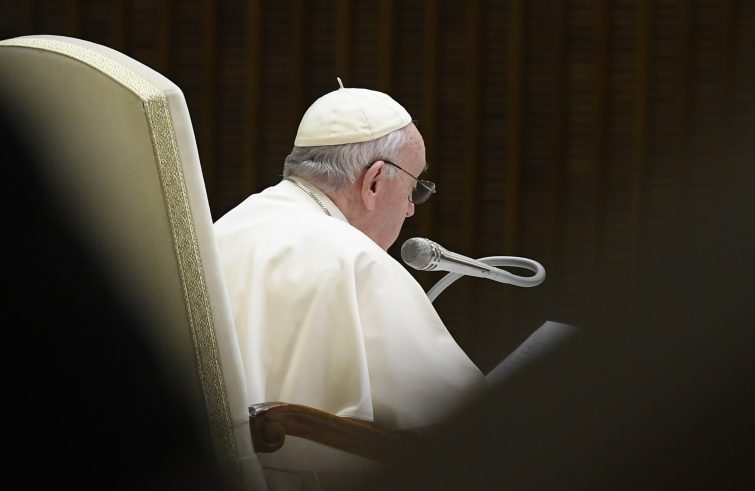
“The worst thing that could happen to us is to think that we are no longer in need of conversion, either as individuals or as a community.” In his traditional address to the Curia for the exchange of Christmas greetings, Pope Francis focussed on the need for conversion, which “is not simply about avoiding evil but doing all the good that we can.” “It is not enough to condemn evil, including the evil that quietly lurks among us”, the appeal to his confreres cardinals: “The first major problem is when we put too much trust in ourselves, our strategies and our programmes.” Vigilance is the antidote to “spiritual pride” and “pelagianism”: “We are in greater danger than all others, because we are beset by the “elegant demon”, who does not make a loud entrance, but comes with flowers in his hand.”
“Some of our failings, also as a Church, are a forceful summons to put Christ back at the centre”,
the Pope said, for “mere condemnation can give the illusion that we have solved the problem, whereas what really counts is making the changes that will ensure that we no longer allow ourselves to be imprisoned by evil ways of thinking, which are often those of this world.”
“Besides the violence of arms, there is also verbal violence, psychological violence, the violence of the abuse of power and the hidden violence of gossip, all of which are so deeply harmful and destructive”,
Francis pointed out. He recalled the sixtieth anniversary of the opening of the Second Vatican Council which he described as a “great moment conversion for the entire Church.” “The contrary of conversion is “immobility”, the secret belief that we have nothing else to learn from the Gospel”, the Pope said, guarding against the mistake “of trying to crystallize the message of Jesus in a single, perennially valid form.” “Instead, its form must be capable of constantly changing, so that its substance can remain constantly the same. True heresy consists not only in preaching another gospel, as Saint Paul told us, but also in ceasing to translate its message into today’s languages and ways of thinking, which is precisely what the Apostle of the Gentiles did. To preserve means to keep alive and not to imprison the message of Christ.” Francis analysed with clockwork precision the way evil lurks in the human soul: “Our initial conversion follows a certain pattern: the evil that we acknowledge and try to uproot from our lives does indeed leave us, but we would be naïve to think that it will long be gone. In short order, it comes back under a new guise. Before, it appeared rough and violent, now it shows up as elegant and refined. We need to realize that and once again to unmask it.”
“They are ‘elegant demons’: they enter smoothly, without our even being conscious of them. Only the daily practice of the examination of conscience can enable us to be aware of them.”
Hence the importance of not falling into “the temptation of thinking we are safe, better than others, no longer in need of conversion.” “All of us have had the experience of getting lost, like that sheep, or of leaving God behind, like that younger son”, Francis said: “These sins have caused us humiliation and for this very reason, by God’s grace, we were able to face them squarely. At this time in our lives, we need to pay greater attention to the fact that, in a formal sense, we are now living at home, within the walls of the institution, in the service of the Holy See, at the heart of the Church. Precisely for this reason, we could easily fall into the temptation of thinking we are safe, better than others, no longer in need of conversion.” “If at times I say things that may sound harsh and pointed – the Pope remarked – it is not because I don’t believe in the value of kindness and persuasion. Rather, it is because it is good to keep our caresses for the weary and the oppressed, and to have the courage to ‘afflict the comfortable’, as the Servant of God Don Tonino Bello liked to say. For there are times when the comfort they enjoy is only the deception of the devil and not a gift of the Spirit.”
“Never as at this time have we felt so great a desire for peace”, the Pope said in the opening lines of the second part of his speech, devoted, once again, to “war-torn Ukraine”, and to “the many ongoing conflicts in different parts of our world. War and violence are always a catastrophe.”
“Religion must not lend itself to fuelling conflicts”, Francis said: “The Gospel is always a Gospel of peace, and in the name of no God can one declare a war to be ‘holy.’”
“In the presence of the Prince of Peace who comes into the world, let us lay aside all weapons of every kind.”
“May none of us profit from his or her position and role in order to demean others.”
“Mercy means accepting the fact that others also have their limits”, remarked the Pope, for whom “it is fair to accept that individuals and institutions, precisely because they are human, are also limited.” “Church that is pure and for the pure is only a return to the heresy of Catharism.” Francis counselled: “Were that the case, the Gospel and the Bible as a whole would not have told us of limitations and shortcomings of many of those whom today we acknowledge as saints.” “Finally, forgiveness means always giving others a second chance, in the realization that we become saints by fits and starts. God does this with every one of us; he keeps forgiving us; he keeps putting us back on our feet; he always gives us another chance. We ought to do the same.”


